
Overview
This article offers an overview of property development manager jobs, underscoring their vital role in overseeing real estate initiatives from feasibility studies to project completion. These managers adeptly navigate regulatory complexities and market demands, demonstrating their significance in the industry.
It details the essential skills, responsibilities, and growth opportunities available, showcasing the increasing demand for their expertise in a competitive and evolving property market.
Introduction
In the dynamic realm of real estate, the significance of a Property Development Manager has reached unprecedented heights. As the landscape continues to evolve, these professionals are entrusted with steering complex projects from inception to completion, adeptly navigating a myriad of challenges along the way.
With a growing demand for skilled managers to oversee multifaceted developments, it is essential to comprehend their responsibilities, qualifications, and the market dynamics that shape their work. This article delves into the pivotal role of Property Development Managers, exploring the skills necessary for success, the core responsibilities they uphold, and the promising career outlook that awaits in this ever-changing industry.
From managing stakeholder relationships to ensuring compliance with regulatory standards, the insights provided here illuminate the critical contributions of these managers in shaping our built environment.
Defining the Role of a Property Development Manager
In 2025, a Development Manager plays a crucial role in guiding property initiatives through their entire lifecycle, from initial feasibility studies to final completion. This multifaceted position requires the coordination of diverse stakeholders, including architects, contractors, and investors, ensuring that projects are executed on schedule and within budget constraints.
Navigating the complexities of regulatory environments is a key responsibility, as is managing risks associated with construction. The Development Manager must also ensure that initiatives align with current market demands and client expectations, which are increasingly influenced by economic fluctuations and evolving consumer preferences. In a competitive market, offering premium quality services is essential for managers to differentiate themselves from others, as the market can often present homogenous offerings.
The ability to balance competing priorities while maintaining a strategic vision is essential for success in this role. As the global property development management industry is projected to reach £25.7 billion by 2024, with the residential segment expected to account for approximately 60% of total market revenue, the demand for skilled development manager jobs is on the rise.
Industry leaders emphasise the importance of risk management and collaboration in this role.
Naismiths provides thorough management services for initiatives, including contract administration, risk management, and technical due diligence, which are essential in real estate. The N3 platform includes an intuitive interface, secure data storage, and real-time monitoring solutions, providing precise cost data and performance assessment, enabling development managers to make informed decisions throughout the lifecycle.
Key Qualifications and Skills for Success in Property Development
To excel in development manager roles, candidates typically require a bachelor’s degree in fields such as real estate, business administration, civil engineering or surveying. However, formal education alone is insufficient; a successful candidate must also possess a robust set of skills essential for navigating the complexities of property advancement.
Key competencies include:
- Management of Tasks: Strong task management abilities are crucial for overseeing various phases of progress, ensuring assignments are completed on time and within budget. This encompasses understanding asset management strategies that effectively monitor workforce, machinery, and equipment, as well as implementing systems that track these assets throughout the project lifecycle.
- Financial Acumen: A deep understanding of financial principles is vital, as they must analyse budgets, forecasts, and financial reports to make informed decisions, particularly in the context of multi-million-pound projects.
- Communication Skills: Excellent communication abilities facilitate effective collaboration with stakeholders, including investors, contractors, and regulatory bodies, ensuring that all parties are aligned throughout the project lifecycle.
- Regulatory Knowledge: Familiarity with local laws and regulations is vital to ensure compliance and avoid potential legal issues, which is a key focus during the pre-contract phase of construction projects.
- Negotiation Skills: The ability to negotiate effectively can lead to better contracts and partnerships, ultimately influencing project success.
In 2025, the emphasis on continuous professional development is more pronounced than ever. Certifications like the Certified Real Estate Manager (CPDM) are increasingly acknowledged as valuable credentials that enhance a candidate’s qualifications and marketability. Moreover, statistics show that educational credentials greatly influence career success; for example, in the UK, a significant percentage of Real Estate Managers possess advanced degrees, indicating a trend towards higher educational attainment in the sector.
The increasing significance of digital skills is underscored by the fact that in 2023/24, 15,760 learners were enrolled in Digital Skills, representing a 53.0% rise. This trend highlights the necessity for Real Estate Managers to adapt to technological advancements in the industry.
Case studies illustrate that successful Development Managers often engage in lifelong learning, adapting to changing market demands and enhancing their skill sets. This dedication to education not only improves individual performance but also contributes to the overall success of property development manager roles, thereby strengthening the connection between qualifications and effective management in real estate.
Moreover, the link between sustainable investment and financial returns is becoming clearer, with a growing emphasis on climate-related risk management.
Aspiring Development Management professionals can explore educational pathways offered by organisations. Finally, it is essential to consider the limitations of in-year ILR data, as accurate data is crucial for assessing educational qualifications and career success in property development management.
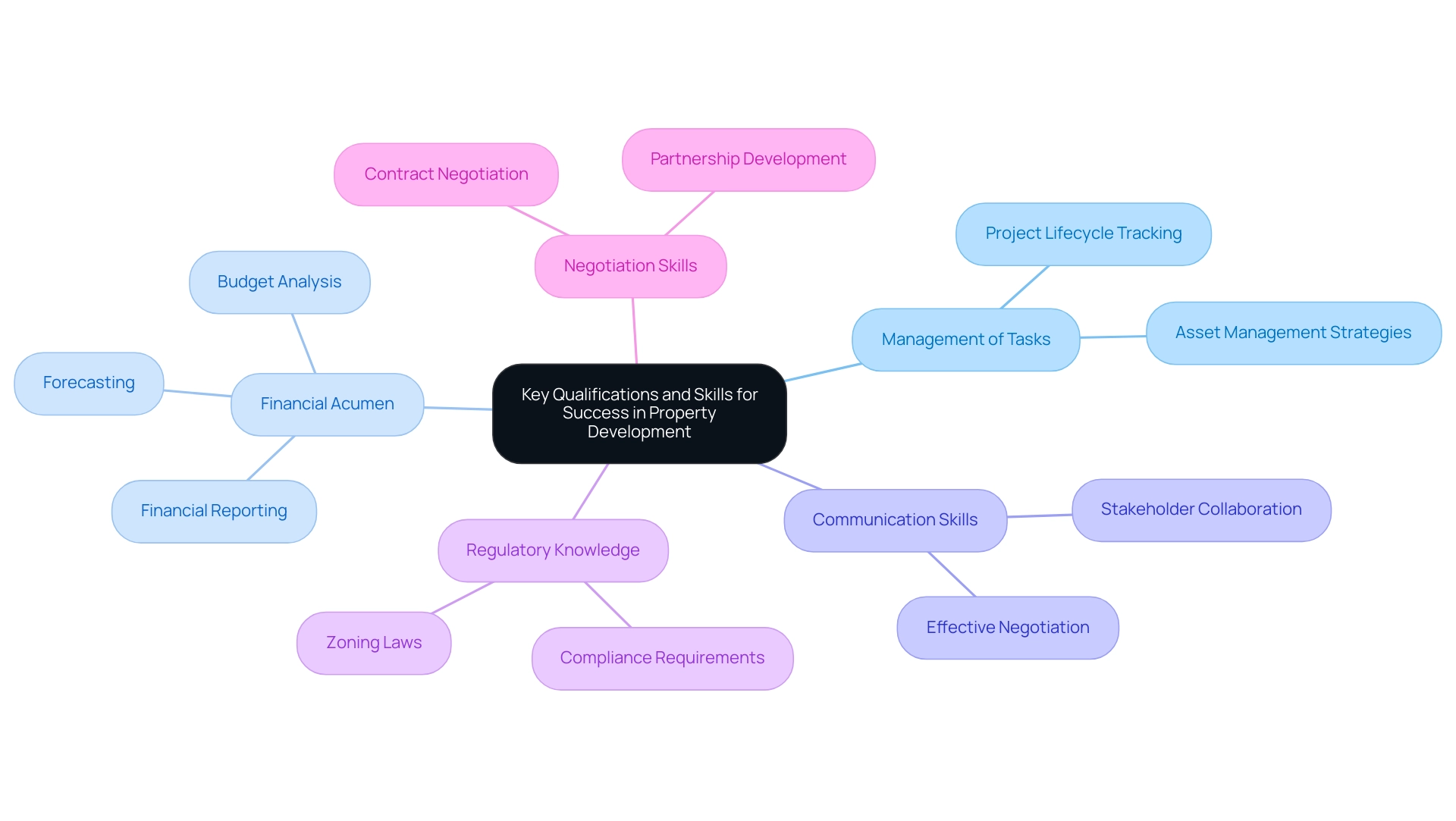
Core Responsibilities of a Property Development Manager
Property development manager jobs play a pivotal role in the successful execution of real estate initiatives, encompassing a range of critical responsibilities. These professionals conduct comprehensive feasibility studies, which serve as the foundation for initiative viability. They meticulously prepare budgets, ensuring that financial resources are allocated efficiently and effectively.
In 2025, the average budgets overseen by Development Managers in the UK are anticipated to illustrate the increasing intricacy of initiatives, with amounts frequently surpassing several million pounds based on the scale and scope of the endeavour.
Furthermore, overseeing timelines is another crucial responsibility. Development Managers organise the design and construction stages to guarantee that initiatives advance as planned. This involves ensuring compliance with local regulations and securing the necessary permits, which can present significant challenges given the increasing emphasis on sustainability and energy efficiency standards in the UK real estate sector. Notably, the UK mandates minimum energy efficiency standards for commercial properties by 2030, making compliance a pressing concern for development managers.
Effective communication with stakeholders is essential; property development managers are required to provide regular updates and address any concerns that arise throughout the lifecycle of the endeavour. This transparency fosters trust and collaboration among all parties involved. Risk management is also a vital aspect of their role, as these managers must anticipate potential challenges—such as market fluctuations or regulatory changes—and develop proactive strategies to mitigate them.
Naismiths platform (N3), provides reliable data analysis and benchmarking, enabling those in property development manager jobs to make informed decisions and manage risks effectively. This platform offers features such as scenario simulation, risk quantification, and real-time updates, which are essential for effective management.
Recent trends indicate that the commercial real estate industry is poised for a revival in 2025, encouraging leaders to adopt innovative strategies for growth. As highlighted in the UK Real Estate Market Outlook 2025, the anticipated rebound in capital values, driven by lower interest rates and increased investment activity, underscores the importance of skilled management in navigating this evolving landscape.
Ultimately, the objective of Real Estate Managers is to ensure that endeavours are accomplished successfully, meeting both financial and quality standards while adapting to the dynamic demands of the market.
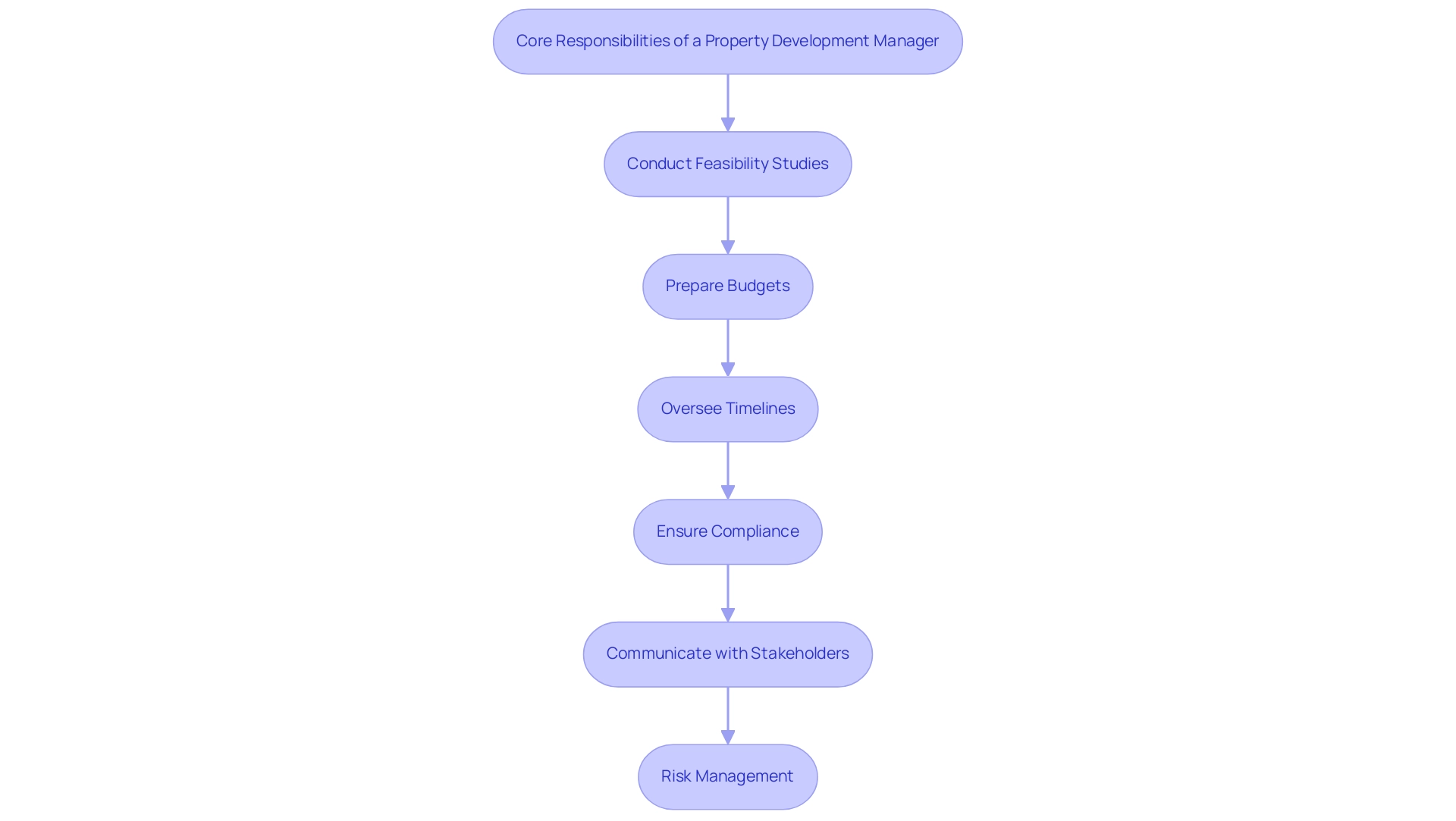
Career Outlook and Growth Opportunities in Property Development
The career outlook for development managers in 2025 is exceptionally promising, driven by a sustained demand for both residential and commercial constructions. As growth accelerates and populations expand, the need for property development managers to oversee complex initiatives is expected to rise significantly. Notably, the construction sector has experienced a compound annual growth rate (CAGR) of 2.7% from 2019 to 2024, indicating a favourable trajectory for property development manager roles.
Growth opportunities extend beyond traditional property construction firms; consultancy roles are increasingly sought after, enabling professionals to leverage their expertise in advising clients on best practices and emerging market trends.
This emphasis on collaboration is crucial for property development manager positions, as it aligns with the competencies necessary for career advancement in this dynamic sector.
Specialisation in lucrative niches, such as luxury residential or sustainable projects, can significantly enhance earning potential for property development managers. A compelling case study reveals that managers who focus on high-demand areas or niche markets are more likely to command higher salaries, as their skills align with the specific needs of the market. Additionally, networking and cultivating a robust professional reputation are essential strategies for career progression.
These efforts can facilitate transitions into senior management roles or specialised positions, further enriching one’s career trajectory within the industry. As the landscape of real estate construction continues to evolve, the outlook for Real Estate Managers remains bright, underscoring the importance of adaptability and ongoing education in this dynamic field.
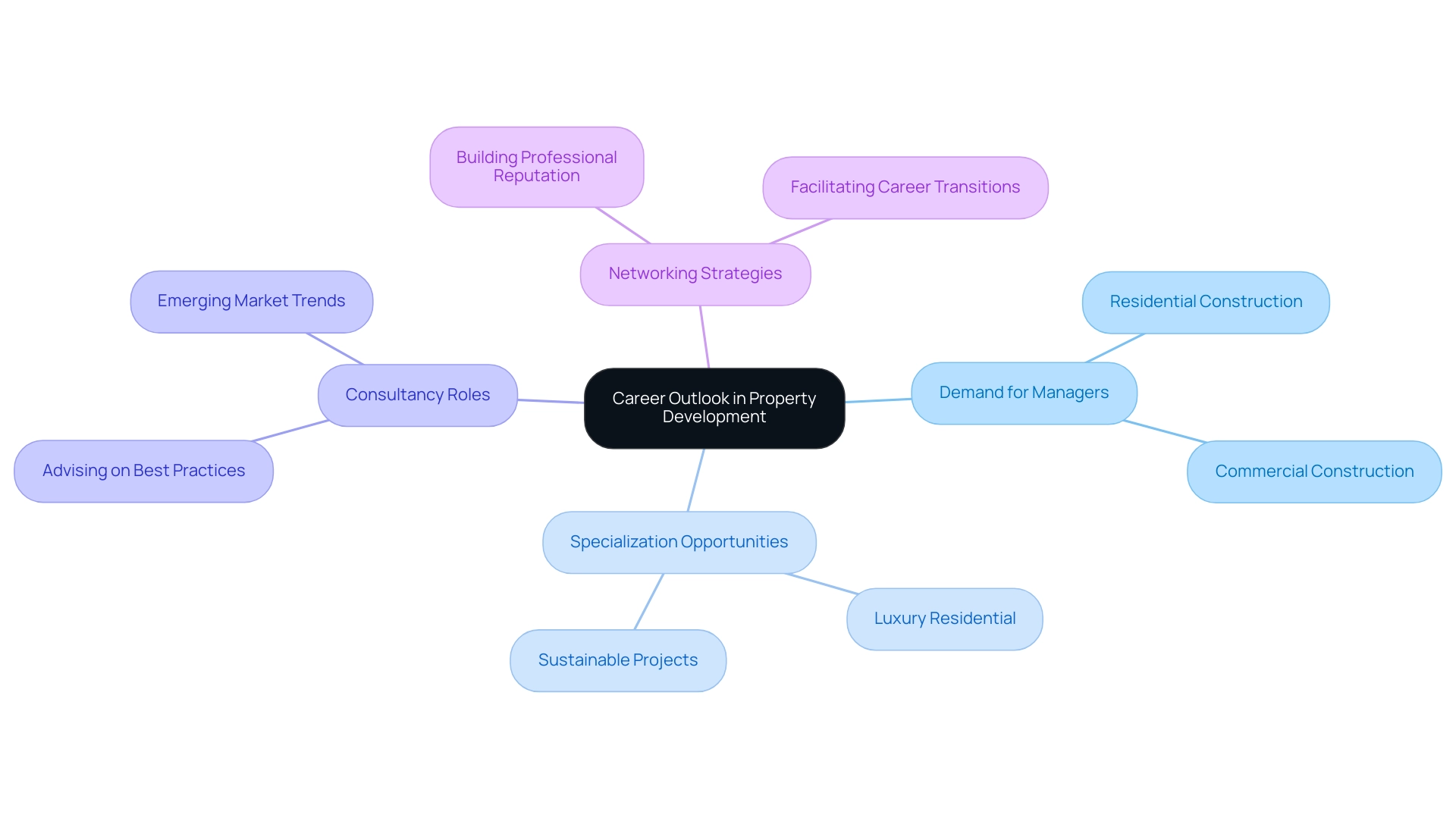
Navigating Challenges in Development Management
In 2025, development manager jobs are navigating a landscape marked by significant challenges, including market volatility, regulatory compliance, and financing hurdles. Economic fluctuations can severely impact the viability of initiatives, underscoring the necessity for managers to conduct in-depth market analyses and adapt their strategies accordingly. The average yield for industrial and logistics properties is projected to rise from 3.8% in 2024 to 4.1% in 2025, reflecting a shift in investment focus that must be considered.
The regulatory environment presents its own complexities, requiring a nuanced understanding of local laws and zoning regulations. As highlighted by industry experts, effective navigation of these regulations is crucial for successful project execution. Development Managers must possess strong communication and negotiation skills to nurture relationships with stakeholders and obtain the necessary approvals. This is particularly important in light of the ongoing demand for lab and office spaces, driven by post-election stability in the UK, which is expected to continue into 2025.
This stability has revitalised venture capital activity, further driving demand in these sectors. Moreover, the current market dynamics reveal a shared confidence in the UK real estate sector, particularly in defensive asset classes such as housing, logistics, and data centres. This optimism is strengthened by case studies demonstrating effective strategies used by Real Estate Managers in unstable markets.
To effectively address these challenges, Development Managers must proactively engage with regulatory compliance issues, leveraging expert opinions and case studies that outline successful navigation strategies. Furthermore, insights into decarbonisation trends and the evolution of hybrid work models are essential as they shape the future of real estate. By doing so, they can enhance results and mitigate risks, positioning themselves as invaluable assets in the evolving real estate landscape.
Furthermore, the large online search volumes regarding the housing market outlook for 2025 indicate a strong market confidence, with no signs of a housing crash, which is crucial for understanding the context in which these managers operate.
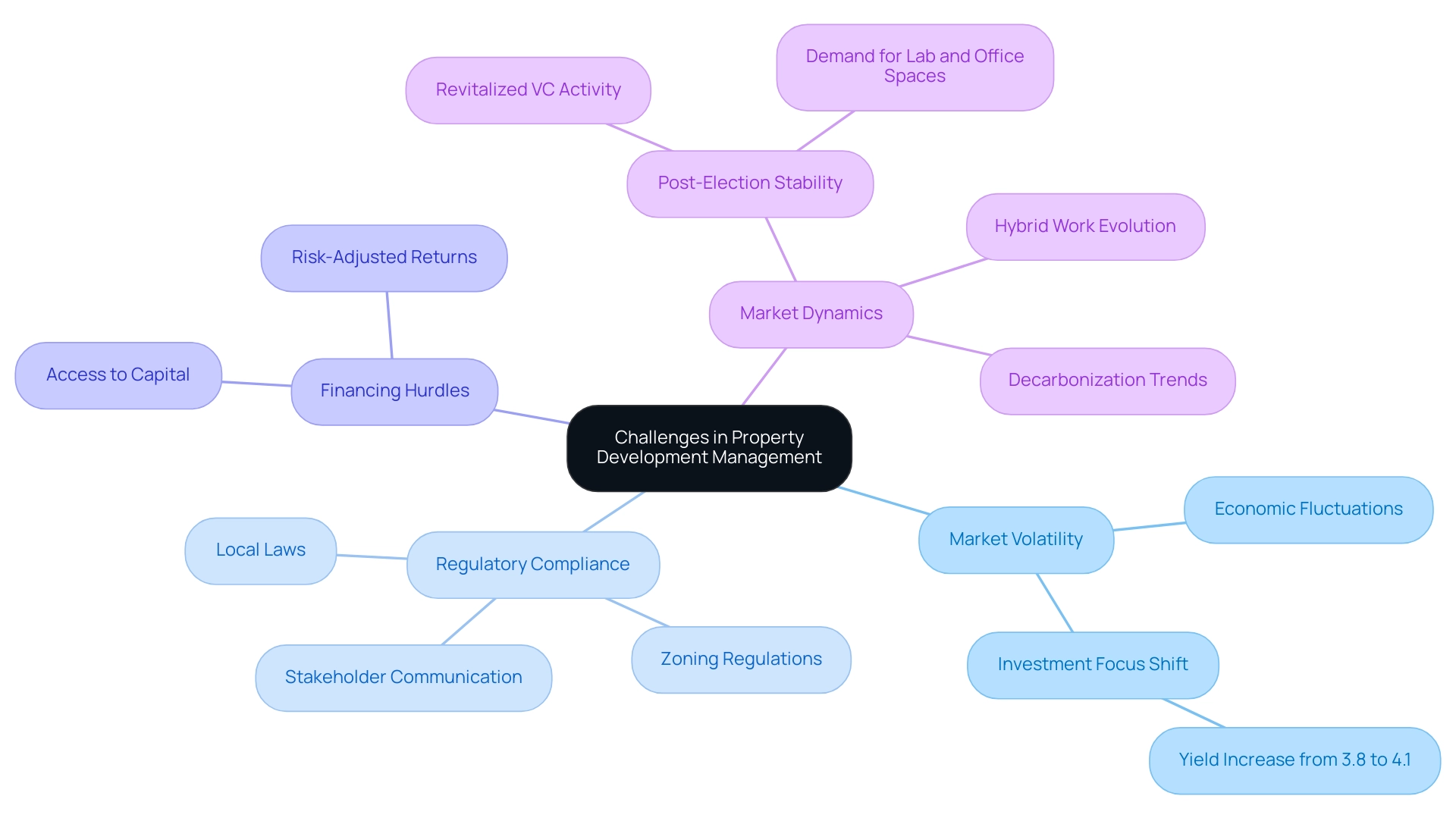
The Role of Project Monitoring and Advisory Services in Property Development
Monitoring and advisory services are integral to the success of property development manager jobs, providing essential oversight and strategic guidance throughout the lifecycle. These services are crucial in ensuring that tasks remain on schedule, within budget, and meet established quality standards. Statistics reveal that only 47% of initiatives are overseen by a professional manager, underscoring the necessity for effective oversight to mitigate risks and enhance outcomes.
‘Naismiths’ comprehensive development platform (N3) exemplifies the value of these services, delivering tailored solutions that improve viability and support successful results. Their intuitive interface allows users to input and monitor all essential data required for a property development endeavour. This facilitates clear, standardised reporting and analysis, enabling regular assessments that empower Development Managers to make informed decisions and guide initiatives back on track.
Furthermore, Naismiths’ commitment to delivering detailed, jargon-free reports fosters transparency and trust, which are crucial for maintaining strong working relationships among stakeholders. Features such as built-in development appraisal tools and interactive dashboards enhance the platform’s functionality, allowing for comprehensive performance assessment. Insights from recent surveys, including Deloitte’s annual global real estate outlook, indicate a strong interest in high-growth property sectors, such as logistics and multifamily housing, suggesting that effective benchmarking and monitoring can significantly impact investment decisions.
Case studies demonstrate that firms utilising comprehensive monitoring services experience higher success rates, reinforcing the importance of these services in achieving desired outcomes.
In summary, the integration of monitoring and advisory services is essential for a development manager aiming to navigate the complexities of the real estate sector effectively. By prioritising these services, stakeholders can improve success rates and ensure that initiatives align with market demands and regulatory requirements. Naismiths’ comprehensive project management services, including contract administration and feasibility studies, further solidify their role as a leader in the property development sector.
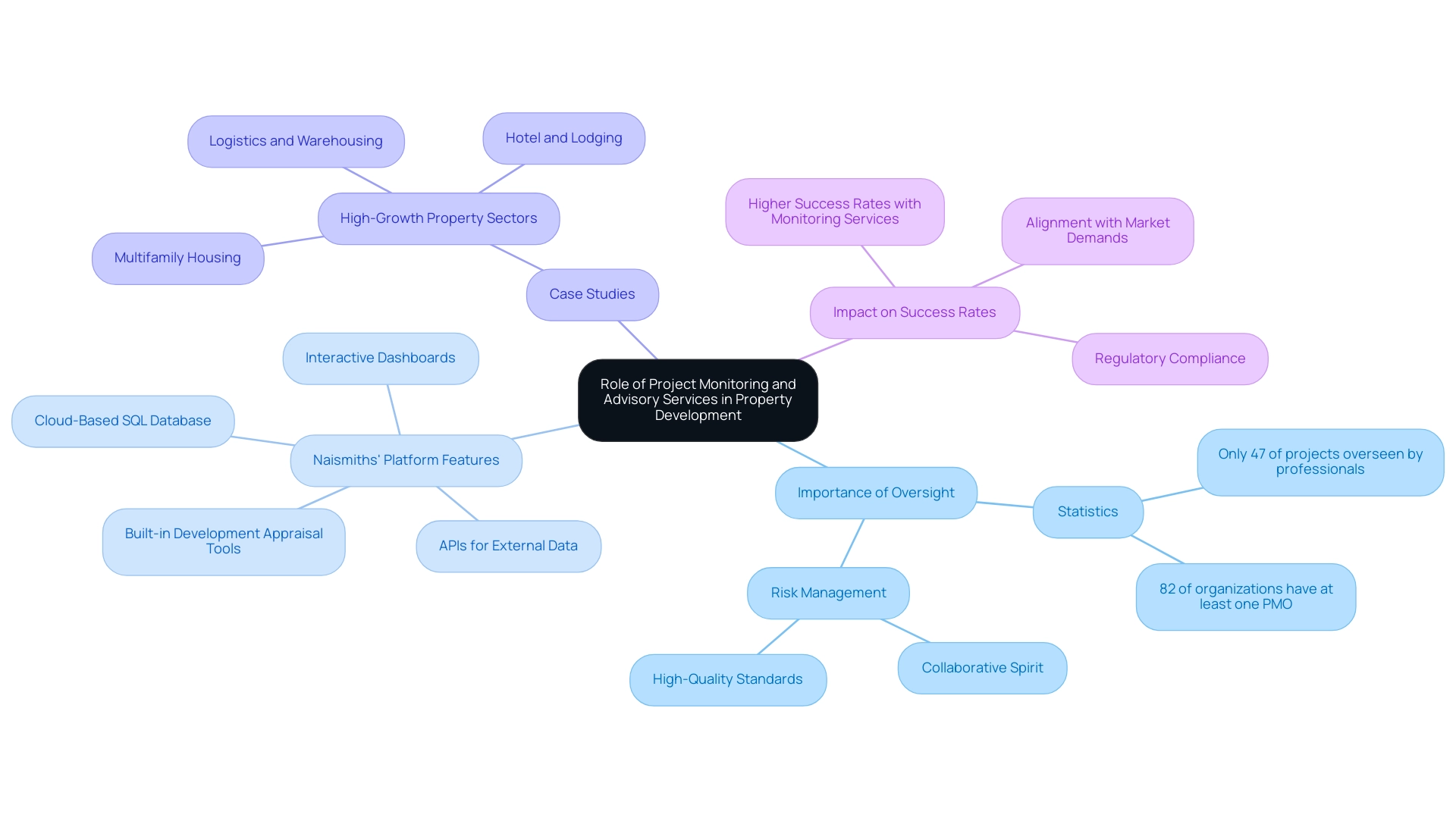
Conclusion
The role of a Development Manager has become increasingly vital in the ever-evolving real estate landscape. These professionals are tasked with steering complex projects from initial feasibility studies through to final completion, requiring a unique blend of skills and expertise. Their responsibilities encompass managing diverse stakeholders, navigating regulatory challenges, and ensuring compliance with market demands—all while maintaining a strategic vision to foster successful outcomes.
Key qualifications such as project management, financial acumen, and communication skills are essential for Development Managers to thrive in a competitive market. Continuous professional development and specialisation in high-demand niches further enhance career prospects, reflecting the dynamic nature of the industry.
Looking ahead, the career outlook for Property Development Managers remains bright, driven by the ongoing demand for residential and commercial developments. The expected growth in urbanisation and the property sector indicates ample opportunities for skilled professionals to make significant contributions. However, navigating challenges such as market volatility and regulatory complexities will require adept management and strategic adaptability.
Ultimately, the contributions of Development Managers are crucial in shaping our built environment. By leveraging their expertise and embracing collaboration, these professionals can ensure that projects not only meet financial and quality standards but also respond effectively to the dynamic demands of the market. As the industry continues to evolve, the importance of their role will only increase, underscoring the need for ongoing learning and adaptability in this vibrant field.